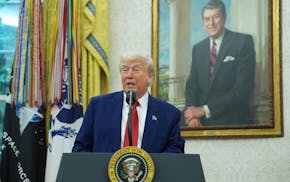Minnesota's new Office of Cannabis Management dramatically shrank the first pool of contenders for cannabis business licenses this week, sending rejection notices to 1,169 of the 1,817 applicants hoping to benefit from a social equity program.
Social equity licenses are intended to help people negatively impacted by cannabis prohibition, veterans and those living in high-poverty areas compete with better-funded entrepreneurs to enter the state's fledgling adult-use marijuana market. More than half of applicants hoping to enter the lottery were from out of state, but the rejection notices were met with disbelief and anger by some Minnesota applicants.
Edina-based cannabis attorney Carol Moss said her firm advised about 15 clients who applied to enter the upcoming license lottery. Roughly half were rejected, she said.
"The most frustrating thing with all of this is that I have not reviewed one [application] that is substantively problematic," Moss said. "We're talking clerical errors that are causing applications to get rejected, ones that would take five minutes to fix."
In a prepared statement, interim OCM Director Charlene Briner said the agency knows those who failed the application review "will be disappointed. However, we are confident that we will have a robust pool of qualified applications enter the lottery, and that those selected will be well-positioned to continue the next steps to opening their businesses."
The OCM said reasons for the denials included failures by applicants to meet qualifying standards, submit proper documentation or meet ownership requirements, as well as "flooding the zone" with multiple applications to game the system. Hundreds of the applications listed addresses in Arizona and California. Twenty-nine applications came from a small town in Arkansas called Eudora.
The initial batch of 282 social equity business licenses will be awarded by lottery, expected by the end of the year.
(Sign up for Nuggets, our free weekly email newsletter about legal cannabis in Minnesota.)
Social equity applicants who win preapproval in the lottery will be able to go to investors, landlords and local governments with the certainty needed to line up the money and approvals required to start their businesses as the state issues full licenses.
Cultivators chosen in the lottery will be able to start planting as soon as they are preapproved, to help ensure a supply of cannabis is available when retailers open for business next year.
Last month, the OCM sent deficiency notices and requests for more information to about 300 social equity applicants, who were allowed up to 14 days to provide additional information or correct parts of their applications.
Moss said some of her clients should have been given the same opportunity, but weren't.
"If they are going to allow some people to revise [their application], then they need to let everybody that got rejected for a similar level of clerical error fix it," Moss said.
The next step for some of her clients is litigation, she said, which could delay the planned lottery and further push back the timeline for launching a retail cannabis market.
"It's the only course left with these clients," Moss said. "My clients are Minnesotans who didn't have a lot of capital to begin with, and now I'm asking them to spend all their resources for litigation. How many of them are just going to shrug and be like, 'I guess we're out'?"
Jen Reise, a Twin Cities cannabis attorney, described the rejection notices some of her clients received as "terse" and lacking details on what caused the rejections.
"When I look at their paperwork, it's either not clear to me what they did wrong," Reise said, "or they had some very minor paperwork error which, in my mind, should have generated a deficiency notice that they would have had two weeks to fix."
Reise said she hopes the OCM will open another window to allow the rejected applicants an opportunity to fix any problems.
The law does not allow for an appeal process for rejected applicants, OCM spokesman Josh Collins wrote in an email. He said approval letters are expected to go out to successful applicants and the lottery will be scheduled soon. Additional lotteries for cannabis business licenses are expected to be held in coming months.
Both Reise and Moss said the rejection of so many applicants raises questions about the OCM's vetting of applications.
"When you deny two-thirds of the applicants, that's a signal to me that there's something wrong with how the process works," Moss said.
Senate Commerce Committee Chair Matt Klein, DFL-Mendota Heights, and Sen. Lindsey Port, DFL-Burnsville, who led the push at the Capitol to legalize adult-use marijuana in Minnesota, released a statement Wednesday praising the OCM's efforts.
"The social equity licensing process addresses a challenge that every other state has struggled with while establishing a legal recreational cannabis market," the senators said. "We are proud of the Office of Cannabis Management's work to uphold our Minnesotan values in its licensing process."
Amtrak's Borealis beat ridership expectations in first year. Minnesota wants to build on its success.

31 Palestinians are killed heading to a Gaza aid site, witnesses say. Israel denies responsibility

Hot, dry weather challenges wildfire suppression efforts in northeastern Minnesota
Two people injured in shooting outside University of Minnesota arena released from hospital
